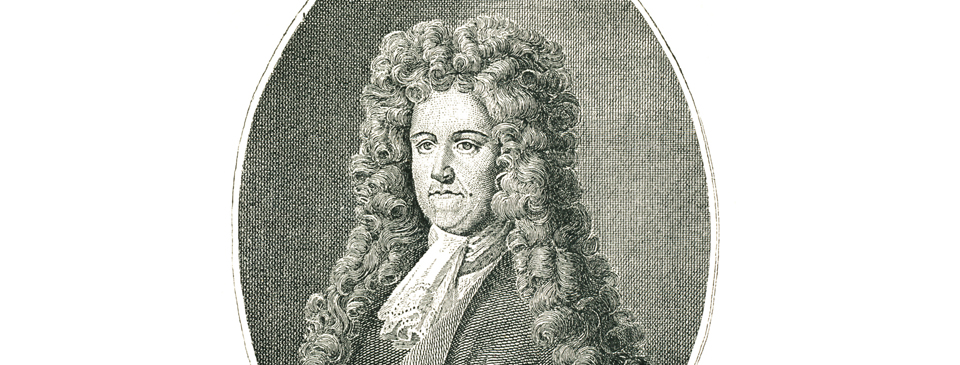Daniel Defoe

An engraving of Daniel Defoe when he was about 43 years old. It was produced by the Flemish engraver Michael Vandergucht, after a painting by Jeremiah Taverner, and used as the frontispiece of Defoe’s 1703 book ‘A True Collection of the Writings of the Author of the True Born English-man’.
The wars against the French had been the issue that most dominated Defoe’s writing in the Review. When the Treaty of Utrecht was signed with France in April 1713 it more or less signalled the end of Defoe’s career as a journalist and spy. In June, after over nine years of publishing his weekly paper, he signed off to his readers with the words “Exit Review.” At around the same time his sponsor, Robert Harley, Lord Oxford was dismissed from office as Queen Anne entered her final days.
Never far from trouble, Defoe was again in court in 1715. He had unwisely written a letter for publication in a paper in which he denounced the Earl of Anglesey as a Jacobite. He was found guilty and faced another spell in prison and a large fine. He escaped his fate by agreeing to work as a spy for Robert Walpole while also writing for Tory newspapers.
At the same time Defoe was embarking on a new career that would leave his name to posterity. From 1714 he produced a steady stream of books on a variety of subjects and his first novels were written in around 1718. The following year came his most famous, The Life and Strange Surprising Adventures of Robinson Crusoe. Partly inspired by the true story of the Scottish sailor Alexander Selkirk, it also drew on Defoe’s own interest in the Caribbean, South America, and the voyages of Sir Walter Raleigh. The adventure was an immediate success and, with the initial print run of 1,000 quickly selling out, a new run was made after just one month and others on almost each subsequent month. By the end of 1719 it had been translated into Dutch, French and German and still remains in print today, the idea of a person marooned alone on an island becoming a modern-day cliché.
In 1722 alone six Defoe books came out in print, including Captain Jack and what is today one of his best-known works, Moll Flanders. This latter featured the life of the eponymous woman, born to a prisoner at Newgate, who survives through thick and thin despite her own bad judgement and misfortunes. Having himself spent some time in the same prison, Defoe was able to write with first-hand knowledge. His final storybook – Roxana, published in 1724 – was another story of a feminine anti-hero. In some ways this can be considered his finest novel, written with greater skill and with a more complex storyline than previous works.
There was a brief lull in writing and then between 1724 and 1726 Defoe published a description of 13 tours around Britain, contained in three volumes. It was written anonymously “by a Gentleman” in the form of letters to the reader and much of the information had been collected on his spying trips some ten to fifteen years earlier. Written in Defoe’s normal opinionated style the work nevertheless remains a valuable historical description of Britain, including London, in the early part of the 18th century immediately before the Industrial Revolution. During the 18th century people began to travel around the country purely for the experience of visiting new places and it continued to be re-written and reprinted by publishers long after his death, going into a ninth edition by 1779, remaining in print today in edited form.
By that time Defoe was in his mid-sixties, in ill-health and financially constrained. A serious operation left him as a partial invalid and still pursued by creditors for earlier debts. Unable to pay and in danger of spending his last years in prison he was forced to go into hiding for the remainder of his life. He left the family home at Stoke Newington and initially hid at Greenwich and later in the City. Defoe continued to survive by writing pamphlets and books. His last completed work was published at the end of 1730 but he was still writing when he died of a stroke at his lodgings at Rope Maker’s Alley, aged about 71, in April 1731.
Sources include: Richard West ‘Daniel Defoe: The Life and Strange, Surprising Adventures’; Daniel Defoe ‘A Tour Through the Whole Island of Great Britain’ (Penguin edition); Adrian Tinniswood ‘By Permission of Heaven’; Barry Coward ‘The Stuart Age’.
< Back to London People


